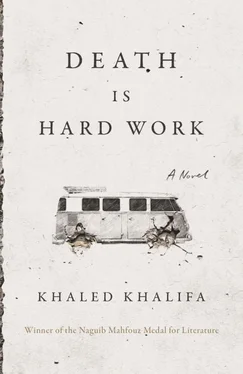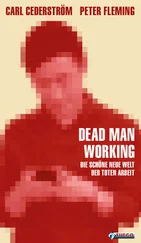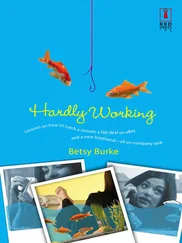An hour later, the same agent opened the door and pushed a new prisoner inside. Bolbol reminded him of their situation and their agreement, and the agent asked him to come outside. The money changed hands discreetly, after which the agent returned to the cell and pointed at Hussein and Fatima and told them to stand up and leave at once. He reminded them that they still needed to send the death certificate to the civil-records office and make sure their father was struck off the list of wanted criminals.
A few minutes later, they were waiting outside the officer’s room. The agent who had pocketed their money opened the door for them and disappeared, leaving them to his superior, who proceeded to address them at length on the latest news of their case. He informed the family that his commanding officer had asked him to confirm the death of the criminal personally, and thereby close the file and allow his family to bury him. All three siblings stood in front of him politely and attentively as he spoke; they praised the kind heart of the commander, who had looked on their situation with a sympathetic eye and refrained from requiring that the body be sent to a medical committee to verify what was obviously true. After refusing to provide them with an official document verifying that the warrant for their father had been canceled, which would have prevented other checkpoints from holding and questioning them yet again, the officer concluded his short speech and said that their way would be clear after this checkpoint; their problems would lie with the checkpoints set up by the terrorists nearer to Aleppo. The officer said the word “terrorists” most emphatically, then indicated with a brief wave of his hand that they should leave before he changed his mind, or anyway before a telegram arrived demanding that the corpse be taken back into custody. In such a case, there would be no alternative but to obey orders. One gesture from the commander, he repeated, and their lives would once again be turned into a living hell.
It wasn’t the first time they had been made to stand attentively in front of such exhortations, but it was certainly the first time they’d been so close to sliding into the labyrinth. Bolbol had by no means been confident of the outcome of all his negotiations, so he was overjoyed when the minibus was allowed to leave the checkpoint, and the whole complex soon lay some distance behind them. He felt he’d been very close to the ultimate moment—the moment he had avoided for four years. He had felt this same giddiness before, whenever he escaped arrest for a crime he hadn’t committed. On those occasions, his identity card with its incriminating birthplace had been the principal problem; now, the body of his father, the wanted man, had almost drowned them all.
Evening brought back all their fear and confusion, however. Hussein was offended now that Bolbol had struck the deal alone. He considered it irresponsible for an amateur like him to have handled a case as grave as theirs—it ought to have called for his own expert negotiation and people-reading skills. He managed not to complain about it and made do with stating that they had to think of where they would spend the night, adding a casual comment that thirty thousand liras was pretty steep just to ensure safe conduct for a shipment of smuggled goods. Bolbol was afraid that Hussein would conclude by saying that their father wasn’t worth this sum when he was alive, so how could he be worth it dead? Really the price should have dropped by at least three quarters, as with selling used shoes.
Hussein didn’t say it—but neither could he keep quiet. In fact, he soon suggested that they toss the body out on the roadside, asking his brother and sister how confident they were that they would pass other checkpoints without trouble. They would be right back where they started if the next checkpoint agents discovered that their father was a wanted man. He added that the dogs were eating plenty of bodies nowadays, so what difference did it make? Why didn’t they just leave it or bury it anywhere and go back to Damascus?
Bolbol could tell that Hussein wasn’t joking this time; he wanted an answer, wanted his brother and sister to make a decision. Bolbol wanted to ignore him, but suddenly a great strength welled up inside him, and he declared he wouldn’t abandon his father’s body before his last wish was carried out. Fatima agreed and asked Hussein to speed up, even though it would be impossible for them to arrive at Anabiya that night in any case. The highway came to an end a few kilometers before Homs, and they would have to use the side roads, which were dangerous at night; no rational being would even consider traveling them in the company of a dead man.
Whenever Bolbol saw trucks crossing checkpoints with ease, he wished his father’s body would turn into a sack of cumin; it was hard to see any downside to such a transformation—in fact, reaching a state of mutual understanding with a sack of cumin would be easier and far less dangerous. He deeply regretted promising his father to do as he’d asked. Forget about changing Abdel Latif into a sack of cumin—Bolbol would have been content to see himself transformed into a man with a little less sympathy.
The night before, he had sat on the bed next to his father while Abdel Latif told him in a feeble voice that his death was very near. Bolbol tried to divert his father’s attention from these forebodings and thought briefly that his father was just having a nightmare, thanks to the death all around and the bombings that hadn’t been silent for three years—that Abdel Latif was entering one of his states of delirium, which had become more and more frequent in the past month. Of course, you didn’t have to be sick to have the same problems. Everyone suffered from insomnia and interrupted sleep these days, from panic attacks and nervous breakdowns; everyone spent entire nights discussing sleep aids, such as chamomile flowers brewed with rosemary, milk mixed with crushed garlic, or Faustan-brand sleeping pills; Bolbol, too, liked to talk over the recipes he’d tried, or to discuss with his colleagues how best to cover their windows with plastic wrap so that the glass wouldn’t become shrapnel when it shattered. Recipes and helpful hints were also frequent topics of discussion for the people stuck at checkpoints for hours in the scorching afternoons and under the pouring rain. Taking naps was good; it helped the dreary evenings pass a little more quickly. Small things like that could cheer people up… or, alternatively, could destroy their lives and drive them out into the unknown, as in the case of this corpse, which had begun to turn rotten. When they left the hospital, they hadn’t wondered what would happen to them. All three were too busy calculating how long it had been since they had last spoken to one another. Their throats were clogged with words that would rust and waste away if they weren’t finally let out. Fatima at least wanted to regain some tenderness in her relationships with her brothers, but Bolbol had no desire to concede a thing to his siblings. Certainly there had been times when he wanted to return to that old familial harmony, but usually he felt that there was simply too much distance between them now. Getting away from them was the only positive thing he’d accomplished in the last ten years, he thought sometimes. And if they were honest, his sister and brother felt the same way, painful though it would be for anyone to admit—all believed that they had already done more than their duty for the family. Now it was time to consider their own lives.
Yes, the previous night, their father had felt keenly that he was dying. He had done everything he wanted to do in this life and had said everything he needed to say during his stay with Bolbol. But despite the illness, Bolbol hadn’t believed his father would really die. It wasn’t credible that anyone could still die of natural causes in this day and age. Even his neighbor Um Elias had been murdered, though she was in her eighties. A young relative and his friends conspired to break into her house and force open her strongbox, which everyone said contained millions of liras and several kilograms of gold. She put up a fight and recognized them, so they killed her. The police were even forced to follow it up and do a little actual police work so the killing wouldn’t be recorded as a sectarian crime. That would have sent the Christian inhabitants of the quarter into a panic.
Читать дальше












